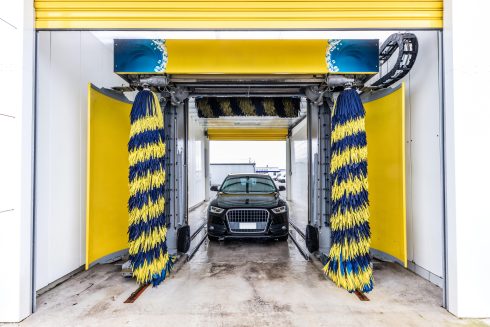IT was an offer that was easy to refuse. “Invest a thousand bucks in our project and you could make a million,” suggested two fun-loving young Canadians as they circulated around the bars of Nerja.
Their main investment seemed to be in San Miguel. So everybody laughed and called for another round.
Everybody — except a bar-owner, a fellow Canadian. “Why not?” he said, and bought a share.
Today he’s a millionaire, for the project he invested in was Trivial Pursuit, possibly the most successful board game of all time — more than 100 million copies of the game have been sold in 26 countries and in at least 20 languages. Estimated return: well over $1 billion.
The originators of the game were journalists Chris Haney and Scott Abbott.
Haney’s death in Toronto last month, at age 59, after a long illness, has stirred memories of his struggles as a young man when he and Abbott wintered on the Costa del Sol while devising their game.
Haney, a high-school dropout, was working as a picture editor in Montreal when on December 15, 1979, he and sportswriter Abbott were playing Scrabble on the kitchen table. They wondered — between beers — if they could invent a game as good.
After they quickly sketched the game’s classic wheel-and-spoke design on a bar napkin, the idea took off and it was time to search for investors. In the winter of 1980 they quit their jobs to work on the project.
They headed first for a few months to Nerja, where they lived at El Capistrano, a villa resort where Haney’s parents had a house.
They allegedly worked 16 hours a day figuring out details of their game and thinking up thousands of questions, the trivial the better. Most Nerja folk, however, saw only their hard-drinking side.
They frequented local bars including El Capistrano’s La Cueva, idled on the Balcony of Europe and consumed paella — with adequate liquid refreshment — at Ayo’s popular restaurant on the Burriana beach.
In total they found 33 people willing to cough up 1,000 dollars for five shares, or who had accepted shares in payment for services. Some investors were friends of the creators, but Haney would not allow his own mother to invest for fear she would lose her money.
Despite the investments, Haney and Abbott’s savings were vanishing and they were desperate for cash.
They touted their idea around Nerja — in vain. Invest in some unheard-of board game? Get serious!
But one Nerja resident — just one — decided to take a chance and become a shareholder.
At first it seemed Haney and Abbott had made a disastrous blunder. Nobody cared about their game with its 6,000 questions about inconsequential matters printed on 1,000 cards. (The game was originally called Six Thousand Questions).
They lost money on every game they sold. When they tried to promote Trivial Pursuit at the New York Toy Fair in 1982, most of their booth’s visitors were people who had gotten lost and needed directions to the lavatory.
But then, miraculously, sales began to climb. Word-of-mouth recommendations spread. People loved the game. Within two years cheques began pouring into the shareholders’ bank accounts, including that of the Nerja bar-owner, although he did not advertise the fact. It was to prove one of the best investments ever. T
rivial Pursuit sold by the million, all over the world. In 1984, Time magazine called it “the biggest phenomenon in game history.”
“I was the architect and Chris was the general contractor. I invented it and he made it happen,” says Abbott.
There have been 42 different editions of the game, including one for Beatles fans, one for baby boomers and even one on Star Wars.
Scott and Haney became multi-millionaires. They acquired golf courses, vineyards and racehorses.
Haney, a scraggy six-footer with a handlebar moustache, loved Spain but hated flying, so every year he would take the Queen Mary 2 with his second wife to cross the Atlantic and spend time in Marbella.
He was in paradise on the Costa as he was a keen golfer with a handicap of 13, sometimes playing six days a week. With Abbott, he built in Canada two of North America’s top-ranked courses, the Devil’s Pulpit and the Devil’s Paintbrush.
A friend noted: “He believed that travel was the best education and he invented Trivial Pursuit in the hope that it would earn him enough cash to live on the beach in Spain and travel around Europe.”
One Trivial Pursuit investor, Chuck Stoody, a veteran Canadian Press photographer who worked with Haney in Montreal, described him as a generous, kind-hearted guy with “a great sense of humour”.
They often frequented a Spanish restaurant in Montreal with their families. Recalls Stoody: “We had lots of laughs, drank lots of sangria and Chris inevitably would start singing some Spanish song. A lot of fun times.”
Wherever he went, in Nerja, Marbella, Montreal or Toronto, Haney was remembered as a generous, larger-than-life character. He will be sorely missed.
He was charmingly unpretentious. Though knowledgeable enough, he liked to joke: “I quit school in Grade 12. It was the biggest mistake I ever made — I should have done it in Grade 10.”
David Baird is the author of Don’t Miss The Fiesta!, available from Maroma Press (http://maromapress.wordpress.com/) or English bookshops and Amazon.co.uk. Also at http://www.smashwords.com/books/view/15830





